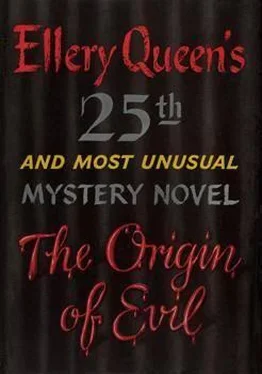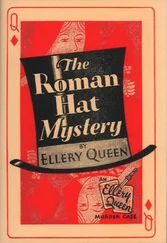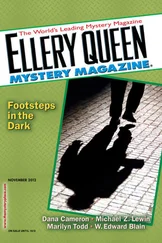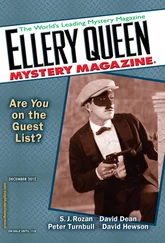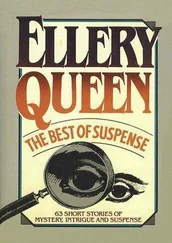That none of these pleasantly exciting stories was true everyone took for granted, but authoritative information was lacking. Delia Priam’s father was not available for comment; he had stuffed some things in a duffel bag and gone off to Canada to prospect, he said, for uranium ore.
And her son simply refused to talk to reporters.
To Ellery, privately, Crowe Macgowan confided that his mother had entered a retreat near Santa Maria; he spoke as if he never expected to see her again.
Young Macgowan was cleaning up his affairs preparatory to enlisting in the Army. “I’ve got ten days left,” he told Ellery, “and a thousand things to do, one of which is to get married. I said it was a hell of a preliminary to a trip to Korea, but Laurel’s stuck her chin out, so what can I do?”
Laurel looked as if she were recuperating from a serious illness. She was pale and thin but at peace. She held on to Macgowan’s massive arm with authority. “I won’t lose you, Mac.”
“What are you afraid of, the Korean women?” jeered Crowe. “I’m told their favorite perfume is garlic.”
“I’m joining the WACs,” said Laurel, “if they’ll ship me overseas. I suppose it’s not very patriotic to put a condition to it, but if my husband is in Asia I want to be in the same part of the world.”
“You’ll probably wind up in West Germany,” growled the large young man. “Why don’t you just stay home and write me long and loving letters?”
Laurel patted his arm.
“Why don’t you just stay home,” Ellery asked Crowe, “and stick to your tree?”
“Oh, that.” Crowe reddened. “My tree is sold.”
“Find another.”
“Listen, Queen,” snarled Delia’s son, “you tend to your crocheting and I’ll tend to mine. I’m no hero, but there’s a war on ― beg pardon, a United Nations police action. Besides, they’ll get me anyway.”
“I understand that,” said Ellery with gravity, “but your attitude seems so different these days, Mac. What’s happened to the Atomic Age Tree Boy? Have you decided, now that you’ve found a mate, that you’re not worth preserving for the Post-Atomic Era? That’s hardly complimentary to Laurel.”
Mac mumbled, “You let me alone... Laurel, no!”
“Laurel yes,” said Laurel. “After all, Mac, you owe it to Ellery. Ellery, about that Tree Boy foolishness...”
“Yes,” said Ellery hopefully. “I’ve been rather looking forward to a solution of that mystery.”
“I finally worried it out of him,” said Laurel. “Mac, you’re fidgeting. Mac was trying to break into the movies. He’d heard that a certain producer was planning a series of Jungle Man pictures to compete with the Tarzan series, and he got the brilliant idea of becoming a jungle man in real life, right here in Hollywood. The Atomic Age silliness was bait for the papers. It worked, too. He got so much publicity that the producer approached him, and he was actually negotiating a secret contract when Daddy Hill died and I began to yell murder. The murder talk, and the newspaper stories involving Mac’s stepfather ― which I suppose Roger planted himself, or had Alfred plant for him ― scared the producer and he called off the negotiations. Crowe was awfully sore at me, weren’t you, darling?”
“Not as sore as I am right now. For Pete’s sake, Laur, do you have to expose my moral underwear to the whole world?”
“I’m only a very small part of it, Mac,” grinned Ellery. “So that’s why you tried to hire me to solve the case. You thought if I could clear it up pronto, you could still have the deal with the movie producer.”
“I did, too,” said young Macgowan forlornly. “He came back at me only last week, asking questions about my draft status. I offered him the services of my grandfather, who’d have loved to be a jungle man, but the ungrateful guy told me to go to hell. And here I am, en route. Confidentially, Queen, does Korea smell as bad as they say it does?”
Laurel and Crowe were married by a Superior Court judge in Santa Monica, with Ellery and Lieutenant Keats as witnesses, and the wedding supper was ingested and imbibed at a drive-in near Oxnard, the newly weds thereafter scooting off in Laurel’s Austin in the general direction of San Luis Obispo, Paso Robles, Santa Cruz, and San Francisco. Driving back south on the Coast Highway, Ellery and Keats speculated as to their destination.
“I’d say Monterey,” said Keats emotionally. “That’s where I spent my honeymoon.”
“I’d say, knowing Mac,” said Ellery, “San Juan Capistrano or La Jolla, seeing that they lie in the opposite direction.”
They were both misty-eyed on the New York State champagne which Ellery had traitorously provided for the California nuptials, and they wound up on a deserted beach at Malibu with their arms around each other, harmonizing “Ten Little Fingers and Ten Little Toes” to the silver-teared Pacific.
After dinner one night in late September, just as Alfred Wallace was touching off the fire he had laid in the living room, Keats dropped in. He apologized for not having phoned before coming, saying that only five minutes before he had had no idea of visiting Ellery; he was passing by on his way home and he had stopped on impulse.
“For heaven’s sake, don’t apologize for an act of Christian mercy,” exclaimed Ellery. “I haven’t seen any face but Wallace’s now for more than a week. The lieutenant takes water in his Scotch, Wallace.”
“Go easy on it,” Keats said to Wallace. “I mean the water. May I use your phone to call my wife?”
“Wonderful. You’re going to stay.” Ellery studied Keats. The detective looked harassed.
“Well, for a while.” Keats went to the phone.
When he came back, a glass was waiting for him on the coffee table before the fire, and Ellery and Wallace were stretching their legs in two of the three armchairs around it. Keats dropped between them and took a long sip. Ellery offered him a cigaret and Wallace held a match to it, and for a few moments Keats frowned into the fire.
“Something wrong, Keats?” Ellery asked finally.
“I don’t know.” Keats picked up his glass. “I’m an old lady, I guess.
I’ve wanted to chin with you for a long time now. I kept resisting the temptation, feeling stupid. Tonight...” He raised his glass and gulped.
“What’s bothering you?”
“Well... the Priam case. Of course, it’s all over―”
“What about the Priam case?”
Keats made a face. Then he set the glass down with a bang. “Queen, I’ve been over that spiel of yours ― to me at the Hollywood Division, to Priam that night in his room ― it must be a hundred times. I don’t know, I can’t explain it...”
“You mean my solution to the case?”
“It never seems to comp out as pat when I go over it as it did when you...” Keats stopped and rather deliberately turned to look at Alfred Wallace. Wallace looked back politely.
“It’s not necessary for Wallace to leave, Keats,” said Ellery with a grin. “When I said that night at Priam’s that I’d taken Wallace into my confidence, I meant just that. I took him into my confidence completely. He knows everything I know, including the answers to the questions that I take it have been giving you a bad time.”
The detective shook his head and finished what was left in his glass. When Wallace rose to refill it, Keats said, “No more now,” and Wallace sat down again.
“It’s not the kind of thing I can put my mitt on,” said the detective uncomfortably. “No mistakes. I mean mistakes that you can...” He drew on his cigaret for support, started over. “For instance, Queen, a lot of the hoopla you attributed to Priam just doesn’t fit.”
Читать дальше
